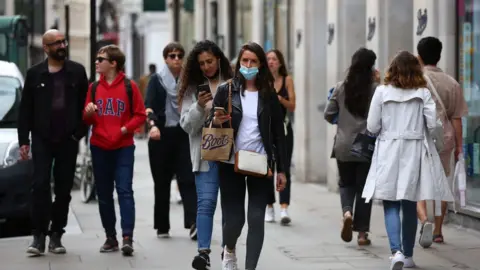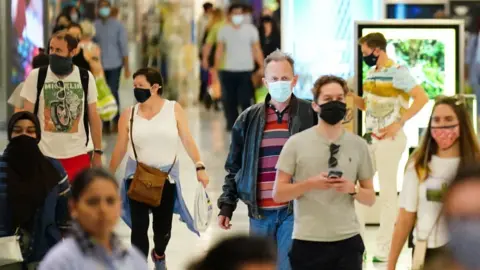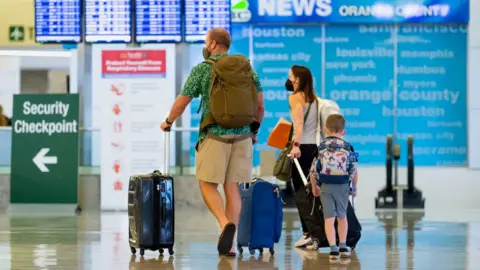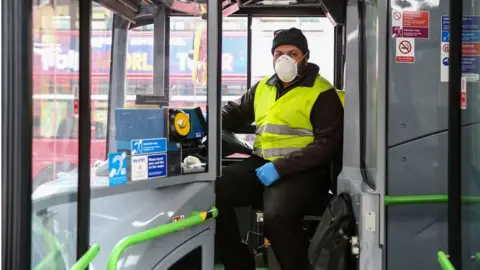Firms left to decide own rules on face masks
 Getty Images
Getty ImagesFrom Monday 19 July the government has said wearing face coverings in England will be recommended but not mandatory.
It says bus and train companies must now decide whether passengers have to continue to wear face coverings, with rules being replaced by government guidance advising passengers to wear masks only on busy services.
Some airlines have already confirmed face masks will still be compulsory after 19 July, while other businesses, including shops, pubs and hairdressers, are setting out updated policies.
So, following government confirmation of the easing of rules, what are businesses' intentions?

Some pubs and leisure firms to encourage mask wearing but not enforce it

Martin Dalby chief executive of Center Parcs said masks would be encouraged for both staff and customers in the indoor sections of its holiday parks.
"The approach from Center Parcs will be to recommend that both our employees and our customers do wear face coverings when in indoor settings - that's the advice we're going to give them." But he added: "It's not mandatory and we won't be policing it."'
He also said they would not be asking for a Covid passport, proving vaccination status.
Clive Watson, chief executive of the City Pub Group, which has 45 pubs across the south of England and Wales, has said masks will be encouraged after 19 July and as much table service as possible will continue: "We don't want a free-for-all scrum at the bar, loads of people queuing up."
Staff will also be encouraged to continue to wear masks.
However, Chris Jowsey, chief executive of Admiral Taverns, which has 1,000 pubs, has said the lifting of all restrictions is "long overdue". He adds that 19 July will "be critical for the future of our industry, supporting community hubs across the UK and allowing businesses to operate as normal once again".

Shops remain cautious
 PA Media
PA MediaThe boss of the Timpson shoe repair and key cutting chain, Sir John Timpson, says he will leave mask wearing as a matter of personal choice for his customers: "I don't think the way it's going we've got any right, we shouldn't expect them to do so, that's entirely up to the customer."
But he said his staff would be asked to wear masks.
"We will certainly advise them that what they should be doing as far as masks are concerned is to do the right thing to look after our customers - and that means wearing a mask when customers are within the shop.
"The wearing of masks is not mainly to protect yourself, it is to protect other people, and I think that we've still got to do that even though there's no legal requirement to do so."
Shop workers union Usdaw had previously urged the government not to lift Covid safety measures in shops.
"Retail staff are working with the public every day and are deeply worried about catching Covid-19," said Paddy Lillis, Usdaw general secretary.
"This is not the right time to water down safety in stores and the government should not be removing the requirements for face coverings and distancing in busy public areas like shops."
Sainsbury's boss Simon Roberts has said mask wearing in stores will be a matter of "personal choice" after 19 July. And the Westfield shopping centre group has said it will "encourage" customers to wear masks.


The focus on masks is disproportionate to the impact they can have. Retaining mask-wearing is not going to significantly alter the course of the rising infections.
The fact remains the most important measure is for people to isolate when ill.
Instead, the debate is symbolic of a wider issue - the importance of communication and messaging.
There's real frustration among government scientists about the mixed messaging coming out on masks as they fear it gives the impression we no longer need to be careful.
That's not true because how quickly normal behaviour returns - and that means everything from ditching masks and returning to the office as well as clubbing - makes a big difference to the summer wave.
An immediate return to normal could make the peak of hospital admissions twice as high as a more gradual return.
The modellers believe this is much more important than delaying the lifting of restrictions, which will have very limited impact on the peak.
It's why England's chief medical adviser Prof Chris Whitty was stressing the need to go slowly with the new freedoms - and why the way mask-wearing is communicated is crucial.

Beauty in the 'breathing zone'
 Bloggs Salons
Bloggs SalonsLesley Blair, chair of the British Association of Beauty Therapy and Cosmetology (BABTAC), a membership organisation and insurance provider for professionals working in the industry, would like mask wearing to continue. Ms Blair says that the organisation will encourage members to consider the the evidence as part of their risk assessments and continue to wear them "especially when working in the breathing zone".
Among smaller businesses, Joe Hemmings, who owns two hairdressers in Bristol, says he'll be taking a staged approach to mask wearing: "To go from all of the PPE to nothing overnight is too radical for the sheer fact of peoples' anxiety and the need for precaution."
Eight of his 17 staff are aged about 30 and won't have had their second jab by 19 July. "We need to make sure we can do everything we can to protect the team," he says.
If customers refuse to wear a mask, Mr Hemmings says "it's a tricky one" but he'll "have to honour" their decision. "We'd like to think it is everyone's best interest for us all to wear them inside," he adds.

Airlines: Little reason to change policy
 Getty Images
Getty ImagesRyanair has said masks will be mandatory, regardless of the departing destination. A spokesperson added that this was in keeping with current guidance from the European Union Aviation Safety Agency and the European Centre for Disease Prevention and Control.
British Airways has also said it sees no reason yet to change its existing rules, requiring staff and customers to wear masks, but said it was keeping its policies under constant review.
EasyJet and Virgin have also told customers that passengers should continue to wear them.
Passengers flying with Jet2 will not be allowed to board their flight without a face mask, unless they have previously given a reason for not wearing one.

What about public transport?
 Getty Images
Getty ImagesThe Mayor of Greater Manchester, Andy Burnham, said some of the 3.8 million people classed as clinically vulnerable would be "fearful" to go on public transport if masks were not compulsory.
He told BBC Radio 4's Today programme he had not yet taken the decision whether to require masks on trams in Manchester as he wanted to avoid adding to people's confusion.
Industry body the Rail Delivery Group, which represents train companies, says that travelling by train is "low-risk" and "any decision to leave public transport behind other parts of the economy would need to be based on the science".
However, the Unite union has said previously that dropping mask-wearing on public transport would be "gross negligence".
Unite's national officer for passenger transport, Bobby Morton, pointed to the number of deaths from Covid among bus drivers.
He has said that not only does mask wearing reduce transmissions, it helps provide reassurance to drivers and to passengers who are nervous about using public transport.
